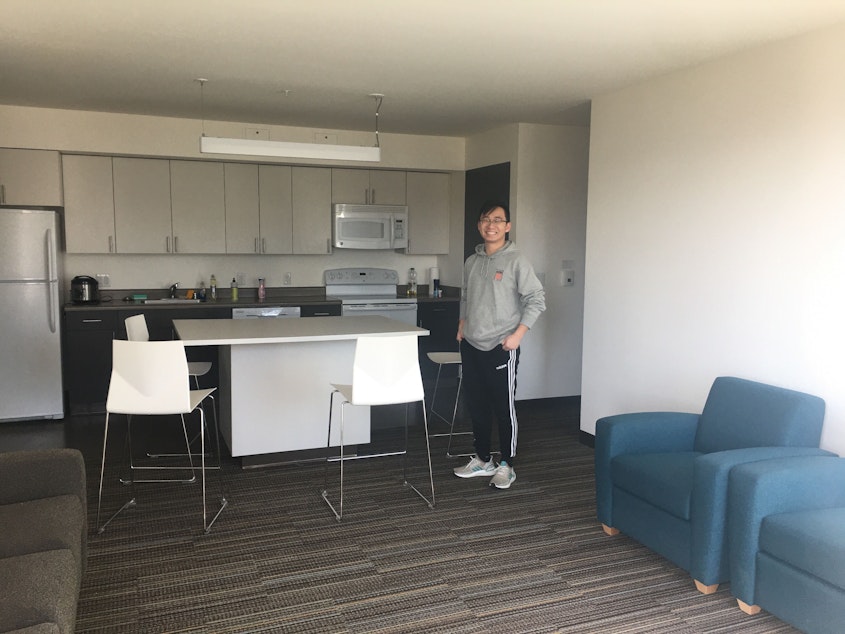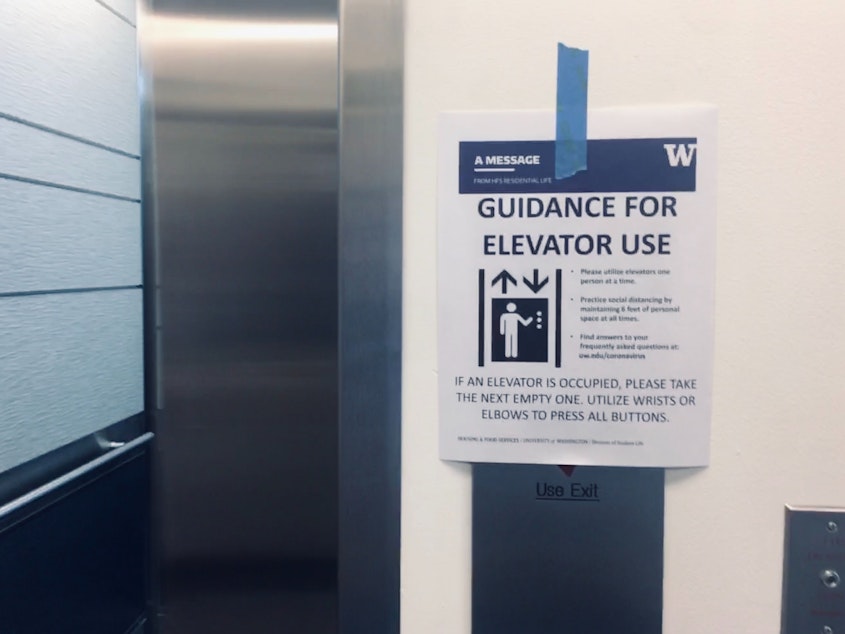College students face uncertain futures during the coronavirus outbreak

College students in Seattle and across the country are adjusting to a new normal as classes move online.
Many students have already moved back home with family. But some are still struggling with their next steps.
At Mercer Court, a student complex at the University of Washington Seattle campus, the halls are mostly empty.
The last few stragglers are moving out their clothes and books, with signature blue latex gloves and face masks ready as they pack up their belongings.
At the laundromat in the building, one lonely dryer runs noisily.
"Now there’s no one here," said Aaron Zhao, a sophomore at the University of Washington studying informatics and education. "It almost feels like I own this entire building," he added while looking around.
Sponsored
His three roommates have already moved out of their shared apartment.
He's the last one left.
The University of Washington announced spring classes would be exclusively online beginning on March 18. Seattle University and other Northwest schools and colleges followed suit.
Zhao plays video games and tries to stay connected with friends through social media but he admits. "Sometimes I barely talk to a person the entire day. And that person is the delivery driver for my Uber Eats."
He's also an international student from Hong Kong.
Sponsored
"I went back during winter break and I left just right before the whole [coronavirus outbreak] started. They're like, 'Oh, you're so lucky! You left right before.' Now I'm in the center of the North American epidemic," he said with a wry laugh.
Zhao plans to go stay with family in Maryland but isn’t sure when he can get a plane ticket — or even how to travel safely.
Still, he aims to move out by next month.
He’s also a teaching assistant, so now he’s thinking about how to teach others virtually in the spring. That's no small feat.

Sponsored
The university has to move nearly 57,000 students to an online only model across three campuses and hundreds of majors.
"We’re basically doing an evaluation of all those courses, of which ones need accommodation and which ones need to be cancelled," said Victor Balta, a spokesperson for the University of Washington, who stresses the quality of education will remain high, regardless of whether courses are in person or online.
That list of classes is still in the works. But one thing's for sure: certain classes just can’t be taken online.
Ariel Oswalt, a junior at the university knows this firsthand. She’s majoring in biology and dance.
"Over half of my credits are in dance," she said. "It just doesn't really make sense for me to do an online education this quarter."
Sponsored
Oswalt is also immunocompromised, placing her at a higher risk of suffering from COVID-19. She's also from California, so she pays more for out-of-state tuition.
"I'm not going to pay, you know, $12,000 or whatever for online school," she said. "So I just decided to take a quarter off."
Oswalt packed up and left last week. She’s not sure what she’s going to do, considering she can't take on a job because of her health. But she is thinking of taking classes through Coursera, an online learning platform that offers hundreds of free courses.
Many college students are struggling with similar concerns about tuition, rent, and their future.

Sponsored
Currently, there’s a petition circulating with over 10,000 signatures asking university officials to partially reimburse students for their spring tuition as in-person resources disappear.
The University of Washington's Balta said that’s not going to happen.
"It very well could be argued that this quarter will be more expensive for the university to see through," he said. The institution still has to pay staff and educators the same as before the outbreak, he explains.
That's likewise for rent. A group of graduate students living at the Radford Court Apartments recently asked the university for a 2-month rent freeze. But Balta said that's also unlikely.
University officials admit they’ve seen a small dip in students who opted not to return for spring classes — about 300 so far.
And as for graduation in June, that may not happen either. Depending on what public health experts recommend, the class of 2020 may not have a ceremony — no caps and gowns, and certainly no graduation parties.
If college was a time of exploration and change before, now it's one of forced flexibility and an even more tenuous future.
It’s a new reality in the time of the coronavirus pandemic.




